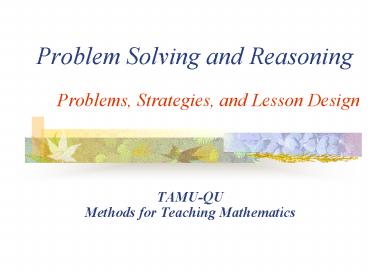Problem Solving and Reasoning Problems, Strategies, and Lesson Design - PowerPoint PPT Presentation
1 / 15
Title:
Problem Solving and Reasoning Problems, Strategies, and Lesson Design
Description:
Problem Solving and Reasoning. Problems, Strategies, and Lesson Design. TAMU-QU ... A Menu is a collection of activities for a student to do. ... – PowerPoint PPT presentation
Number of Views:377
Avg rating:3.0/5.0
Title: Problem Solving and Reasoning Problems, Strategies, and Lesson Design
1
Problem Solving and Reasoning Problems,
Strategies, and Lesson Design
- TAMU-QUMethods for Teaching Mathematics
2
Value of Teaching With Problems
- Places students attention on ideas and sense
making - Develops mathematical power
- Develops the belief in students that they are
capable of doing mathematics and that is makes
sense - Provides ongoing assessment data that can be used
in instructional decisions
3
Hierarchy of Thinking
- Upper two levels
- Higher-Order
CREATIVE
Upper Three Levels --Reasoning
CRITICAL
BASIC
RECALL
4
A problem is defined by
- Any task or activity for which a student is
seeking some goal for which a suitable course of
action is not immediately apparent. A
mathematical problem requires the use of math
skills, concepts, or processes to arrive at the
goal.
5
Criteria for Mathematical Problems
- Perplexing situation that the student understands
- Student is interested in finding a solution
- Student is unable to proceed directly toward a
solution - Solution requires use of
- mathematical ideas
6
Problem-Solving Strategies
- Look for a Pattern
- Make an Organized List
- Draw a Picture
- Guess and Check
- Write an Equation
- Construct a Table
- Act it Out
- Use Objects
- Work Backward
- Solve a Simpler (or similar) Problem
7
Strategy for solving a problem
- Understand the Problem
- Read and Explore
- Plan
- Devise a Plan
- Carry out the Plan
- Solve the Problem
- Look Back
- Reflect on Answer
8
Cooperative Problem-Solving Lesson
Three-Part Format
- Introducing
- Exploring
- Summarizing
9
Introducing
- Present or review concepts
- Pose a part of the problem or a similar but
smaller one - Present the problem to be solve
- Discuss to make sure students understand what
they are to do
10
Exploring
- Observe the interaction, listening for use in
later discussion to groups ideas, strategies,
and work procedures - Offer assistance when needed, either when all
members of a group raise their hands or if a
group is not working - Provide an extension for groups that finish more
quickly than others
11
Summarizing
- Have groups report their processes, both group
procedures and strategies used - Have groups present solutions
- Generalize from the solutions
- Questions to Consider
- How did you organize the work in your group?
- What problems did you encounter?
- What strategies did you use? Which were most
helpful? - How did you arrive at your solution?
- What other strategy might have been used instead?
12
Independent Problem Solving
The Menu
- A Menu is a collection of activities for a
student to do. A menu can provide class work
activities for several days, a week, or for a
longer period of time. The tasks on the menu or
not hierarchical and do not conceptually build
upon each other.
13
How much to tell and not to tell
- Three types of information teachers should
provide to their students - Math conventions
- Alternative methods
- Clarification of students methods
14
GoalsTeaching about Problem Solving
- Strategies and Process
- Develop problem analysis skills
- Develop and select strategies
- Justify solutions
- Extend of generalize problems
- Metacognition
- Monitor and regulate actions
- Disposition
- Gain confidence and belief in abilities
- Be willing to try and persevere
- Enjoy doing mathematics
15
Common Arguments of Problem Solving
- There is not enough time.
- The tests we have to give mainly test arithmetic.
- Parents expect the school to teach arithmetic.
- Problem solving is too hard for students who have
difficulty with the basic skills. - Some teachers are not good in math and do not
feel comfortable teaching what they do not
understand. - What do you think?































